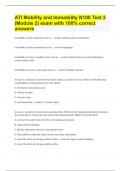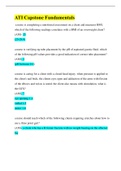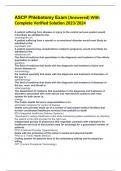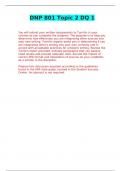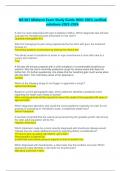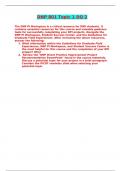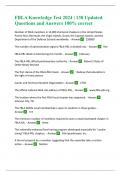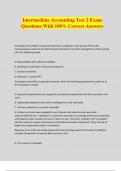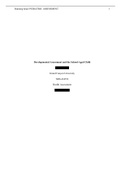test with correct answers
Absolute advantage - answers When a country is more efficient in producing a good or
a service than other countries—that is, it needs less resources to produce the good or
service.
Absolute returns - answers The returns achieved over a certain time period. Absolute
returns do not consider the risk of the investment or the returns achieved by similar
investments.
Accounting profit - answers Difference between the revenue generated from selling
products and services and the explicit costs of producing them.
Accounts payable - answers Money owed by a company to suppliers that have
extended the company credit.
Accounts receivable - answers Money owed to a company by customers who purchase
on credit.
Accrual basis - answers Accounting method in which revenues and related expenses
are recorded when the revenues are earned and the expenses are recognized rather
than when the cash is received and paid.
Accrued liabilities - answers Liabilities related to expenses that have been incurred but
not yet paid as of the end of an accounting period.
Active investment managers - answers Managers who actively buy and sell assets
and/or alter asset allocations and seek to earn excess risk-adjusted returns.
Ad hoc documents - answers Documents that are typically informal, such as letters,
memos, and e-mails.
Adverse selection - answers Tendency of people who are most at risk to buy insurance,
causing insured losses to be greater than average losses.
,Allocationally efficient economies - answers Economies that use resources where they
are the most valuable.
Alpha - answers Out-performance relative to a relevant market benchmark.
Alternative investments - answers A diverse asset class that typically includes private
equity, real estate, and commodities. It provides an alternative to traditional
investments, such as debt and equity securities.
Amortization - answers The process of expensing the costs of intangible assets over
their useful lives.
Annual percentage rate - answers The cost of borrowing expressed as a yearly rate
without compounding.
Annuity - answers The exchange of an initial amount for a fixed number of future
payments of a certain amount.
Appraisal - answers Assessment or estimation of the value of an asset, such as real
estate, that is subject to certain assumptions, which may not always be realistic.
Appreciation - answers A situation in which a currency is getting stronger relative to
other currencies.
Arbitrage opportunity - answers An opportunity to make money by taking advantage of
a price difference between two markets.
Arithmetic mean - answers The sum of the items in a data set divided by the number of
items.
Ask exchange rate - answers The exchange rate at which the bank or dealer will sell
the foreign currency. Also called the offer exchange rate.
Ask prices - answers Prices at which a dealer is willing to sell an asset or a security,
typically qualified by a maximum quantity (ask size). Also called offer price.
Asset allocation - answers The process to determine the proportion of a portfolio to
hold in various asset classes or the proportion of a portfolio held in various asset
classes.
Asset-backed securities - answers Financial securities created by securitization whose
associated payments and value are backed by a pool of underlying assets, such as car
loans, credit card receivables, bank loans, or airplane leases.
Asset class - answers A broad grouping of similar types of investments, such as
shares, bonds, real estate, and commodities.
,Asset manager - answers Investment professionals who receive authority from their
clients to trade securities and assets on their behalf. Also called investment managers.
Assets - answers Items that have value and include real assets and financial assets.
Asset turnover - answers A measure that indicates the volume of revenues being
generated by the assets used in the business, or how effectively the company uses its
assets to generate revenue.
Back office - answers Administrative and support functions necessary to run the firm,
including accounting, human resources, payroll, and operations.
Balance of payments - answers Record that tracks transactions between residents of
one country and residents of the rest of the world over a period of time, usually a year.
Balance of trade - answers The difference between exports and imports of goods and
services. Also called net exports or trade balance.
Balance sheet - answers A statement of the company's financial position at a specified
point in time; essentially, it shows the company's assets, liabilities or debt, and owner-
supplied capital or equity.
Banks - answers Financial institutions that collect deposits from savers and transform
them into loans to borrowers.
Barriers to entry - answers Obstacles, such as licences, brand loyalty, or control of
natural resources, that prevent competitors from entering the market.
Basic earning power - answers A measure that compares the profit generated from
operations with the assets used to generate that income.
Basis point - answers A measure equal to 0.01% or 0.0001.
Benchmark - answers A comparison portfolio (e.g., the S&P 500 Index).
Best efforts offering - answers Type of public offering in which the investment bank acts
only as a broker and does not take the risk of having to buy securities.
Beta - answers A generic term for market risk, systematic risk, or non-diversifiable risk.
Bid-ask spreads - answers Difference between the bid price and the offer price quoted
by a dealer, which represents the compensation dealers expect for taking the risk of
buying and selling securities.
Bid exchange rate - answers The exchange rate at which a bank or currency dealer will
buy foreign currency.
, Bid prices - answers Prices at which a dealer is willing to buy an asset or a security,
typically qualified by a maximum quantity (bid size).
Block brokers - answers Brokers who help investors who want to trade large blocks of
securities.
Board of directors - answers A group of people whose job is to monitor the company's
business activities on behalf of its shareholders.
Bond - answers A formal contract that represents a loan from an investor (bondholder)
to an issuer. The contract describes the key terms of the debt obligation, such as the
interest rate and the maturity.
Book values - answers Balance sheet values of a company's assets, liabilities, and
equity.
Breakeven point - answers The number of units produced and sold at which the
company's profit is zero—that is, revenues exactly cover total costs. If the company
sells less units than the breakeven point, it will suffer a loss. In contrast, if it sells more
units than the breakeven point, it will make a profit.
Brokerage services - answers Trading services provided to clients who want to buy and
sell securities; they include not only execution services (that is, processing orders on
behalf of clients) but also investment advice and research.
Brokered markets - answers Markets in which brokers arrange trades among their
clients, particularly for such assets as large blocks of securities or real estate that are
unique and thus of interest as potential investments to only a limited number of
investors.
Brokers - answers Trading services providers who act as agents and, in exchange for a
commission, arrange trades by finding sellers for their clients who want to buy and
buyers for their clients who want to sell.
Business cycles - answers Economy-wide fluctuations in economic activity.
Buyouts - answers Private equity investment strategy that consists of financing
established companies that require capital to restructure and facilitating a change of
ownership.
Buy-side firms - answers Institutional investors and investment managers who
purchase investment products and services from sell-side firms.
Callable bond - answers A bond that provides the issuer with the right to buy back (call)
the bond from bondholders prior to the maturity date at a pre-specified price.

